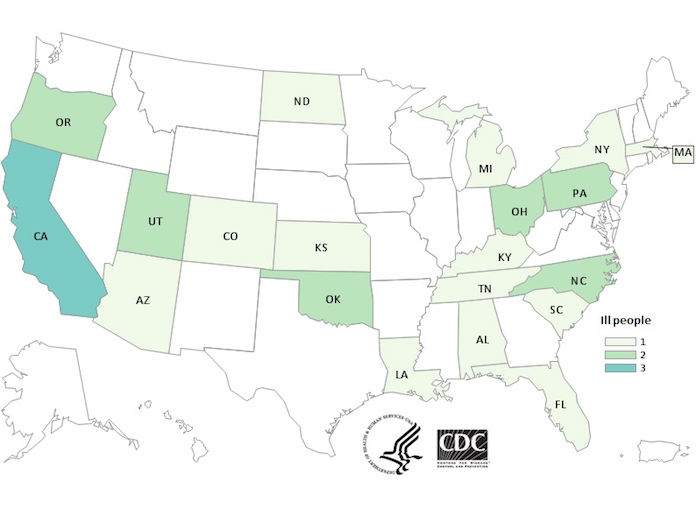The FDA has been warning consumers about kratom, an ingredient used in some dietary supplements, for months. There have been reports of serious adverse events, including 36 deaths, that are associated with the use of products containing kratom.

Now, the CDC has announced a multistate Salmonella I 4,[5],12:b:- outbreak that is linked to kratom. At least twenty-eight people in 20 states have been sickened in this outbreak, as of February 16, 2018. And eleven people have been hospitalized because their illnesses are so severe. No deaths have been reported.
Kratom is a plant consumed for its stimulant effects. It is an opioid substitute. The compound is also known as Thang, Kakuam, Thom, Ketom, and Biak.
The case count by state is: Alabama (1), Arizona (1), California (3), Colorado (1), Florida (1), Kansas (1), Kentucky (1), Louisiana (1), Massachusetts (1), Michigan (1), North Carolina (2), North Dakota (1), New York (1), Ohio (2), Oklahoma (2) Oregon (2), Pennsylvania (2), South Carolina (1), Tennessee (1), and Utah (2). Illness started on dates ranging from October 13, 2017 to January 30, 2018. The patient age range is from 6 to 67 years, with a median age of 41.
Public health officials are using PulseNet to identify people who may be part of this outbreak. That system uses pulsed-field gel electrophoresis (PFGE) and whole genome sequencing (WGS) to identify the DNA fingerprinting of pathogenic bacteria. WGS performed in isolates taken from ill persons were closely related genetically. That means people in this outbreak are more likely to share a common source of infection.
In interviews, ill persons answered questions about foods they ate before they got sick. Eight, or 73%, of 11 people interviewed reported consuming kratom in pills, powder, or tea. The CDC has not identified any common brands or suppliers. At this time, the CDC recommends that people not consume kratom in any form.
The symptoms of a Salmonella infection include abdominal cramps, diarrhea that may be bloody, nausea, vomiting, muscle aches, and a fever. These symptoms usually begin 12 to 72 hours after exposure to the bacteria.
While most people get better on their own within a few days to a week, some do become so ill they must be hospitalized. And the long term consequences of a Salmonella infection can be serious, including reactive arthritis and endocarditis. If you have taken kratom in any form and have been experiencing these symptoms, see your doctor.
The noted law firm of Pritzker Hageman helps people sickened by contaminated food such as kratom protect their legal rights, and get compensation and justice. Our lawyers represent patients and the families of children sickened with bacterial infections in personal injury and wrongful death lawsuits against distributors, dietary supplement makers, retailers, food producers, and others. Attorney Fred Pritzker and his team of experienced attorneys recently won $7.5 million for young client whose kidneys failed because of hemolytic uremic syndrome after an E. coli infection. Class action lawsuits may not be appropriate for outbreak victims because the cases are very unique.




